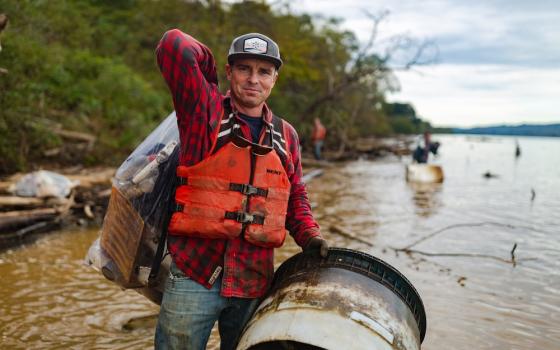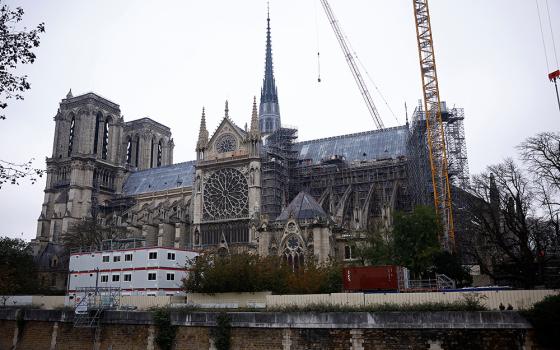Rome -- By the standards of a church with over 2,000 years of history, the Synod of Bishops was essentially born yesterday. It was founded in 1965 by Pope Paul VI at the close of the Second Vatican Council (1962-65), as a means of giving bishops around the world a voice in the governance of the universal church.
Since the synod is a relatively recent arrival, it’s probably not surprising that it continues to break new ground. Even so, the edition which meets Oct. 5-26 in Rome, with the theme of “The Word of God in the Life and Mission of the Church,” is distinctive for at least ten “firsts” it will occasion:
1. Rabbi Shear Yashuv Cohen, the chief rabbi of Haifa in Israel, will address the synod Monday afternoon, Oct. 6, on Jewish interpretation of the Scriptures. This marks the first time a non-Christian has been given the floor. (Cohen’s remarks will be followed by a reflection from French Cardinal Albert Vanhoye, a Jesuit and former secretary of the Pontifical Biblical Commission.)
2. Patriarch Bartholomew of Constantinople, recognized as “first among equals” in the Orthodox world, will lead a celebration of vespers along with Pope Benedict XVI on Saturday, Oct. 18, and then both men will speak to the synod. This marks the first time a non-Catholic figure has will lead a liturgical service for members of a synod, and the first time an Orthodox patriarch will speak during a synod alongside the pope.
3. Benedict XVI celebrated the opening Mass of the synod this morning at the Basilica of St. Paul’s Outside the Walls, the first time the opening liturgy has been held anywhere other than St. Peter’s Basilica in the Vatican. Benedict has designated 2008 as a “Pauline Year.”
4. Cardinal Marc Ouellet of Quebec City will serve as the synod’s relator, making him the official responsible for introducing the discussion, keeping it on course, and for synthesizing the results at the end. Ouellet is the first Canadian to hold the post.
5. Archbishop Laurent Monsengwo Pasinya of Kinshasa, in the Democratic Republic of the Congo, will be the special secretary, another key coordinating role. He is not only the first prelate from Congo, but the first African to hold that post during a “general” synod.
6. On Friday, Oct. 10, there will be a report on the reception of Sacramentum caritatis, the pope’s document concluding the last synod in 2005 on the Eucharist. That discussion will be guided by Cardinal Angelo Scola of Venice, who served as relator in 2005. This is the first time one synod has formally reviewed the results of the one that preceded it.
7. On the first day of the synod, there will be five reports from bishops representing the different continents, speaking on how the Word of God is perceived in their part of the world. In the past bishops have often used their allotted speaking time to comment on their local situations, but this is the first time a panoramic look around the world has been formally built into the schedule.
8. Among the 37 “auditors,” or invited guests, at this synod are 19 women – one more than the men, marking the first time women are in the majority.
9. Each afternoon will include not only prepared speeches by bishops and other participants in the synod, but also an hour of “free discussion” time, intended to allow people to respond to things said during the day or to introduce other matters they want the synod to consider. Benedict XVI instituted this “free discussion” during the Synod on the Eucharist in 2005, but this is the first meeting in which free discussion each day is actually part of the formal rules.
10. Finally, this will be the first time that bishops from around the world gather to discuss a topic only after the pope himself has published a best-selling book on the same subject. The theme this time around is the Bible, which was also the subject of Benedict XVI’s 2007 title Jesus of Nazareth. (It should be noted, however, that Benedict XVI has something of a history of shaping the discussion at a synod with a high-profile book released before the fact.
In 1985, the Synod of Bishops met to take stock of the 20 years that had passed since the close of the Second Vatican Council. Press interest, especially in the early days of the synod, focused on how bishops were reacting to a controversial book-length interview with then-Cardinal Joseph Ratzinger, titled The Ratzinger Report, in which the future pope offered his thoughts on the council’s legacy. At one stage, an exasperated bishop snapped during a press conference, “This is a synod about a council, not a book!”)



